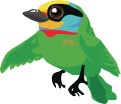 |
| Talking Points(1)(2)(3) |
| (1)Miss Yun-ting Chu |
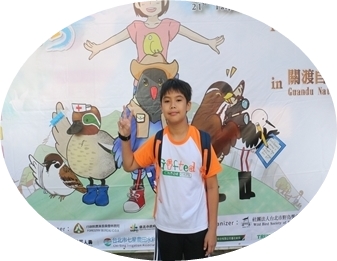 |
Chen,Yu-Jui
In just two hours, we found many kinds of birds, such as
tiger bittern, spotted-necked turtledove and many other novel and
beautiful birds. The teacher also taught us to recognize the sound of
birds, so we learned a lot in this course. |
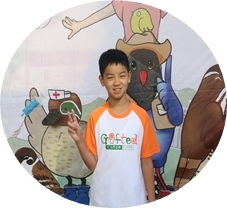 |
WU,CHIA-WEI
I think the teacher is very kind, because she will always
borrow us telescope and take us to watch birds on Changan campus. My
favorite is the tiger bittern, because as long as you don't get too
close, it will stand still and show us, so everyone called it a stupid
bird! |
 |
LIN CHENG-HSU
I think the teacher has his own opinions on bird watching.
The teacher told us that when watching the birds, you can’t attract
birds by calling out birds and feeding them. I think the teacher is
very correct because it may destroy bird habits. |
 |
Chen,Hsi
I think the teacher is very good, because when we see the
birds flying past, she can know which kind of bird it is. I think this
bird watching trip is very interesting and I have gained a lot. |
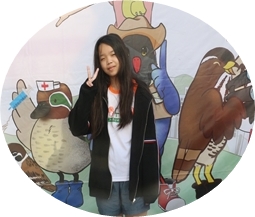 |
HUANG, AN-YU
We listened to whether there were any bird calls and used
a telescope to observe nearby birds. We found sparrow, common myna and
other various birds. At the end we ended with a tiger bittern. It was
originally thought that there were only tiger bittern and Taiwan barbet
in Changan Elementary School. But I saw so many birds today, and I hope
to see more species of birds next time. |
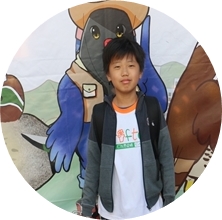 |
Tai,Chung-Hsiang
Ms. Yun-ting Chu's favorite bird is Mikado
pheasant, which is endemic to Taiwan, and its feathers are very
beautiful. We saw a lot of birds that day. It turned out that there
were so many birds hiding in trees and houses at Changan Elementary
School! I also turned to like go bird watching after class! |
 |
Chang,Yung-Cheng
The teacher taught us that we must respect the
birds, do not get too close to them when watching the birds, do not
deliberately feed, and do not use food or items to lure them in order
to see a certain kind of birds, so that they can live in peace with the
birds.
|
 |
Hsu,Xin-Mi
The teacher took us to the Changan Elementary
School campus to find if there were any birds. We probably found more
than 8 species of birds. We appreciated Mr. Zhu for showing us so many
birds, and I learned a lot.
|
 |
Chou,Yu-Fei
At first I didn't think that our Changan Elementary
School campus could have many kinds of birds, but when the teacher took
us to watch birds on campus, I unexpectedly found that there were so
many kinds in my school that I have never seen or completely unknown to
me, and the number was very amazing.
|
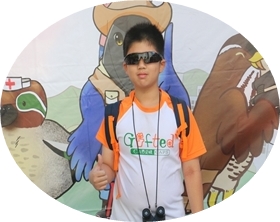 |
Chih,Hao-Ching
Ms. Yun-ting Chu once climbed the snow mountain 4
times to see Mikado pheasant, and didn’t see it until the fourth time.
I think it’s not easy to climb the mountain 4 times for bird watching
like her! |
|
| (2)Miss Chao-Ju Su |
Chen,Yu-Jui
Ms. Chao-Ju Su generously shared the bird watching
experience with us during the interview process. As a volunteer, the
experience of choosing bird watching equipment also allowed us to learn
a lot of bird watching concepts in a short period of time. And it
helped us understand the cost of the initial bird watching equipment on
the market.
|
 |
WU,CHIA-WEI
The teacher said that if you liked nature very much, you
should start with observation, such as understanding the local climate
and road conditions. If it is me, I will only bring a telescope,
because bird watching is just a relaxing leisure activity and I don't
need to be as specific as a professional. |
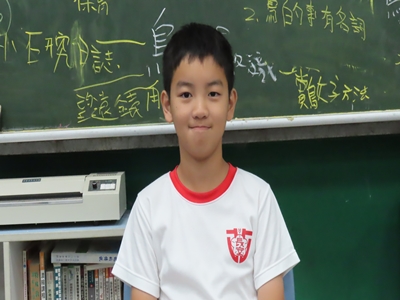 |
LIN CHENG-HSU
I followed Ms. Chao-Ju Su to know birds. I think I have a
lot to learn. I should learn more about nature, learn more about bird
names, and deal with bird-watchers. |
 |
Chen,Hsi
If the
weather is sunny, sometimes you will see several different raptors at
the same time. I think if you can see many raptors circling in the sky,
it must be a spectacular sight.
|
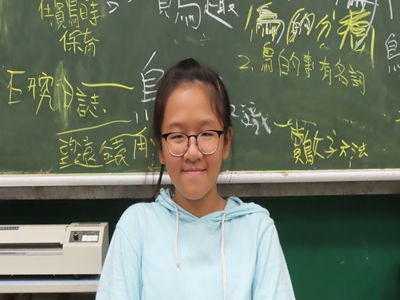 |
HUANG,
AN-YU
We saw a lot of birds in Tianliaoyang, such as the cheela,
Black-winged Kite and other mountain birds. During the interview, the
guide teacher told us a lot of bird-watching knowledge, such as how we
should get along with birds in peace during bird-watching. |
 |
Tai,Chung-Hsiang
Ms. Chao-Ju Su has very rich experience and
knowledge in this field, and Tianliaoyang is a very special place with
rich bird ecology. |
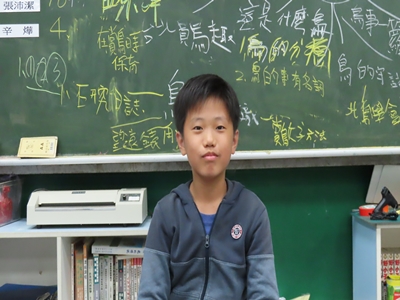 |
Chang,Yung-Cheng
Don't get too close to them when watching birds, because
if you are seen by the bird mother, they may abandon the nest, so the
baby bird will die because there is no food to eat. |
 |
Hsu,Xin-Mi
In the early days of Tianliaoyang, the field paths around
Tianliaoyang were not the current cement ditches, and the ecological
farmland was mostly paddy fields. At that time, the number of birds was
much more than what we see today. For example, black-winged stilt is an
indicator of ecological environment pollution. There were more
black-winged stilts in the past, but we saw only one this time. |
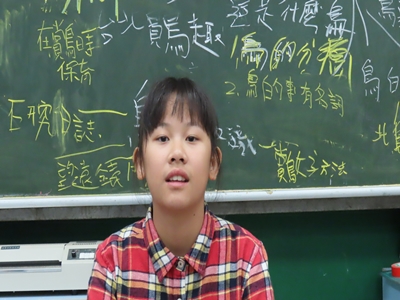 |
Chou,Yu-Fei
We walked from the train station street to the edge
of the field. We were very fortunate that the weather of that day was
cool and the breeze was not very hot, otherwise I didn't think those
birds will come out! We have seen many birds of different ethnic groups.
|
 |
Chih,Hao-Ching
Teacher Su mentioned that volunteering was not only about
taking binoculars and pointing out birds, but to do preparations. When
we are watching birds, we must remember to keep our voice down, and
don’t get too close to the bird's nest, otherwise there will be
innocent baby birds die.
|
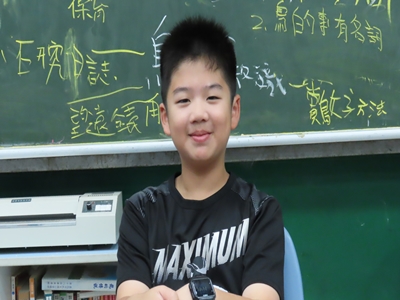 |
|
|
|
| Filmed
by Bird Conservator |
| (3)Mr.
Sheng-Chieh Hsu |
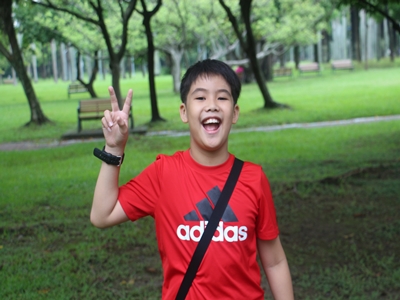 |
Chen,Yu-Jui
The teacher told us that we could usually observe some of
the birds around us. When watching the birds, we must look around and
listen in all directions. During the talk, we also saw two Milvus
migrants. Whether we are watching birds or not, everyone must be
intentionally to protect the environment. |
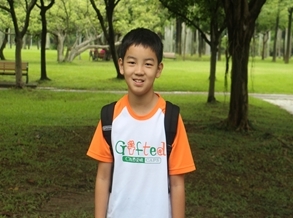 |
WU,CHIA-WEI
The teacher told us that if we want to know all the birds, we
must bring an illustrated handbook. I think we can also wear
binoculars, backpacks, bird-watching clothing and water bottles, and
then observe the birds or even strange creatures around you all the
time. |
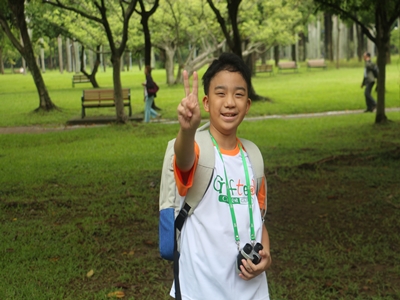 |
LIN CHENG-HSU
He also mentioned that the public will share observation
experience with them. I think this is good because everyone can
understand more. |
 |
Chen,Hsi
What surprised me the most was that two Rufous
turtle dove stood on a branch, almost less than 1 meter away from me.
And they didn't fly away. So I could observe them up close. I think
bird watching not only helps me improve vision, and it can also give us
a better understanding of bird ecology. |
 |
HUANG, AN-YU
I know a very interesting bird called little grebes. It
will dive into the water, so it is difficult to find it. In Guandu
Nature Park, I saw water birds that were not easy to see, and I also
experienced the coldness of watching water birds in winter. |
 |
Tai,Chung-Hsiang
The teacher said that the raptors need airflow, there is
less convection in the cloudy weather, and the lazy raptors are too
lazy to come out. On the crab-friendly platform, crab caves and
foraging behaviors can be observed at low tide from spring to autumn.
We saw common greenshank, light-vented bulbul on the shore. |
 |
Chang,Yung-Cheng
The teachers say activity commentators will recruit
members every year. They will tell you what to do after joining. They
will also let you first understand the ecology of birds, and then you
will take courses in professional birds. |
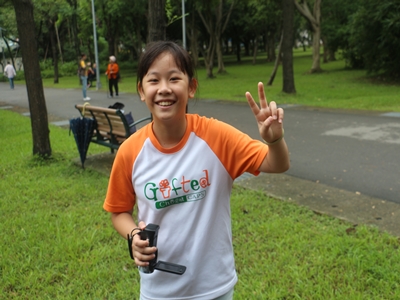 |
Hsu,Xin-Mi
The teacher probably introduced us to the training
process of members of Guandu Nature Park and Wild Bird Society of
Taipei. He said that it usually took a long time to train members to
explain the ecology of birds to the public. |
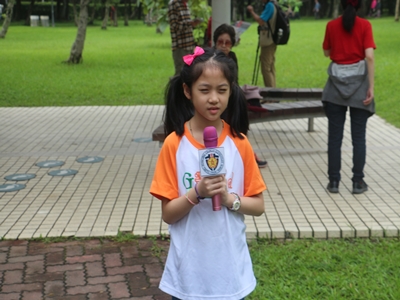 |
Chou,Yu-Fei
My favorite place in the entire park is the
bird-watching hut. It is very dim and has no light except the sunlight
coming in from the outside. Because it is on the second floor, it can
clearly overlook the views below, and it is easier to see the birds. |
 |
Chih,Hao-Ching
Mr. Hsu mentioned that the basic training provided by the
society includes how to identify birds, the reason for the Wild Bird
Society of Taipei, the basic knowledge of birds and how to promote
environmental conservation. |
|
|
 |





















